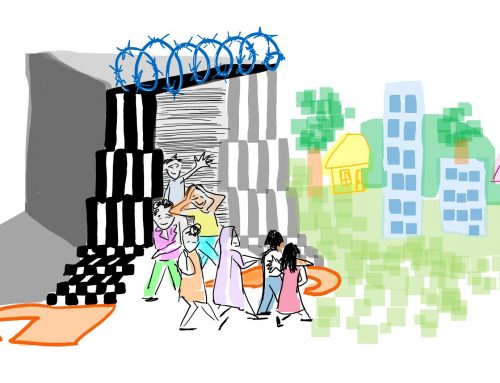Jonathan Ellis, project director at Detention Forum, offers a few individual reflections
With the Home Secretary promising an overhaul of the asylum system in the UK, it is timely to take stock to reflect on why it is so important that we have a policy which allows people to seek safety in the UK.
First off, it’s important to focus on why people do seek to come to the UK. In recent years I’ve been interested to observe how this group of people, who are seeking to cross the Channel, are described as being migrants, and yet many of these people will be coming from countries where they are no longer safe and are seeking safety. So, while there may be some in their number who are migrants, there are also many who are refugees, crossing international boundaries in order to seek safety. In all of this debate around people crossing the Channel, it is too easy to lose sight that many of these people are seeking refuge, seeking safety.
And it is important to reflect on why they are coming to the UK. There are many reasons why individuals should seek safety in the UK. Language is incredibly important, but so are family connections. If we were seeking sanctuary away from our own country where we did not feel safe, issues around language and family connections would no doubt be incredibly important for us. And irrespective of what one may feel about the history of the British Empire, the history of this country has connected us with many more nations across the Earth, who often do still feel an affinity to this country.
Yet so often there are politicians then citing the Dublin convention, which they use as justification for sending people seeking safety back to the first country where they sought asylum. The sheer geographical absurdity of this arrangement never ceases to amaze me. While there may be a degree of sense that people should seek asylum in the first safe country, owing to the fact of geography that it is southern Europe which is the closest area to countries where people are fleeing for safety, the logical extension would be that all asylum seekers would stay in countries such as Greece and Italy. In such a turbulent world, where there is so much conflict and persecution, and so many people seeking safety, it cannot be sustainable that we expect countries on the southern edge of Europe to take the full responsibility of offering such protection.
So, there are legitimate reasons that people might seek to come to the UK, and there are quite legitimate reasons to state that a minority of European countries should not have to take responsibility for the majority of such asylum seekers.
Not only are people who are crossing the channel deemed to be to be migrants (would calling them refugees risk attracting sympathy for them, I wonder?), they are also described as being illegal. Every human on earth has the right to seek asylum. You cannot be an illegal asylum seeker. You may not have your case for asylum accepted, but applying for asylum does not make you illegal.
Many of these people are fleeing for their lives and are seeking safety in the UK for good reasons. Yet for them to seek asylum in the UK, there is no practical safe and legal route to do so. So, they are prevented from entering the country legally.
And once people do arrive across the Channel into the UK, there are growing signs of the Government’s wish to move them straight into detention. These will very often be people who are seeking safety, fleeing persecution, feeling vulnerable after long painful journeys, and is it really the best welcome to lock them up? Is that what we’d like to happen to us if we were seeking safety and protection?
And just in case it may be seen to be slightly distasteful to be locking up innocent people in this way, leaks of recent weeks suggest that the Government is exploring detaining people in offshore centres. And there is the obvious danger here of out of sight, out of mind. Can we be sure that the safeguards that apply in this country would also apply in these offshore centres?
For me, the critical and fundamental point here is how would we want to be supported if we were fleeing from torture and persecution arriving in this country?
For all this talk of people being illegal, wanting to lock them up, and wanting to process their asylum applications thousands of miles away, surely, we must be more humane in our response to this humanitarian tragedy? And the answer cannot be seen as being solely a British answer. The absurdity of the Dublin Convention shows the vital importance of free countries working together in a spirit of solidarity and co-operation to provide safe and legal routes to people to make their claim for protection.
With the crises around the world this is no small matter, but surely the critical element here is how we respond to our fellow human beings in need. We need a policy that is just and humane, and respects and values people as individuals, who deserve to have a fair hearing to determine whether they do need protection.
If the Home Secretary is serious about an overhaul of the asylum system, then I urge her to use a starting principle of how she would want to be treated if she was fleeing for safety.





